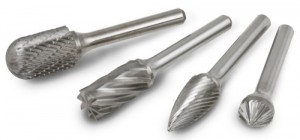Tungsten Carbide Grinding fluid
Non-water soluble straight grinding oil for Carbide grinding

| PRODUCT | Viscosity @40°C | Flash Point COC,°C | APPLICATION | |
| Molylub
SynGrind HC 7 |
8 | > 158 | Fully synthetic oil formulated for grinding tungsten carbide. Contains inhibitors to minimize cobalt leaching. For the initial grinding and regrinding in all areas of carbide tooling which includes carbide inserts, end mills, tipped saw blades, drill tips etc. |  |
Fully synthetic, low evaporation tendency, high sludge carrying properties.
For all grinding applications, especially grinding of tungsten carbide. Flute grinding, external grinding, profile grinding, grinding of saw-blades, grinding of inserts, grinding of aeronautical, medical parts and wear parts.
Grinding is a highly complex manufacturing process due to the stochastic nature of the active zone composed of grains, binder, and pores) and, because of the large numbers of parameters, it influences the surface quality and material removal rate, which are the two main goals of this process.
An important grinding application is the sharpening of cemented carbide cutting tools. Additional features of these processes compared to other types of grinding are the following:
- the small surfaces to be processed, which have many edges;
- high surface quality; small production series;
- different depths of cut;
- and specific mechanical properties of the cemented carbides used for cutting tools.
The application is important because the quality of the clearance and relief surfaces (of the cutting tool) is important for the precision of the manufactured surface and the tool life of the cutting tool.
High carbide hardness requires processing with diamond grinding wheels. Increasing material volume and cutting depth causes an increase in grinding wheel wear. To obtain a low rate of grinding wheel wear we can use larger diameter discs.
Depreciation is lower if the number of active grains on the wheel circumference is higher. The problem of grinding wheel wear has been the subject of numerous analyses of the factors that accelerate the occurrence of this phenomenon. Knowing the process elements that enhance wear, it is important to monitor the behavior of the grinding wheel during processing. Some researchers have shown that wear depends on the length of contact between the wheel and the surface to be manufactured, the pressure in the contact area, and cutting forces .
More specific aspects related to wheel wear grinding cemented carbides. Binder hardness connecting diamond abrasive grains and binder material porosity is relevant in determining the wheel’s capacity to grind. Porous grinding wheels demonstrated a greater capacity than conventional abrades and are easier to balance and recondition. Grinding capacity increases if fine abrasive grains are used. The structure of a complex model that allows predicting the output parameters of the grinding process (roughness, presence of defects and processing accuracy).

